It’s too early to tell, Lt. Gen. (Ret.) Jerry Boykin, one of the original members of the U.S. Army’s Delta Force and now executive vice president of Family Research Council, said on Washington Watch Monday.

"Assad was no Sunday school teacher; [there are] no tears lost about him. But the situation that replaces him is not necessarily going to be any better because you have so many factions that all disagree with one another. So, if [the rebel forces] were to take over Damascus then we could have something worse than what Assad was." Robert Maginnis |
“It has the potential to be a very good thing, but it also has the potential to go the other way and to create more problems than already exist in that part of the world,” Boykin said.
He told show host Tony Perkins the situation looks as though it could have had active CIA efforts to make Assad even more vulnerable. Already his chief allies, Russia and Iran, were involved in other conflicts and less available to come to his aid. The Syrian president and his family eventually fled the country.
Presently, Syria is controlled by the group Hayat Tahrir al-Sham, a Sunni Islamic political and paramilitary group formed in 2017 from a merger of several armed factions.
HTS is led by Abu Mohammad al-Jolani, a prominent figure in the Syrian insurgency leading HTS in military campaigns and territorial gains.
The group was previously affiliated with Al Qaeda but broke ties with it in 2016. Regardless, HTS, after attempts to gain legitimacy in the eyes of other governments, remains a designated terrorist organization by the United States and the United Nations.
Al-Jolani told The New York Times last week that his group’s goal is to “liberate Syria from this oppressive regime.”
HTS, it appears, is changing its spots – and that could be a positive, Boykin said.

“It depends on where the leadership of this HTS, as they call themselves, where the leadership aligns itself. Who do they align themselves with? They have, up to this point, rebuffed ISIS, and so that's a good thing, but that's new, too.”
A lot of eyes are on Syria right now. The Israelis have placed troops in the buffer zone with its northeastern neighbor.
Assad didn’t necessarily encourage the spread of the gospel, but he largely left Christians alone. Some of them served in his legislature, Boykin noted.
“Now, he was an awful man, and we're seeing now with what's coming up out of some of the ground, which is people that they thought were dead, and they've now found that, no, they were in prison underground. That ought to tell you something about what Assad was like,” Boykin offered.
Jordan’s likely role
Boykin said it’s likely that a reluctant Jordan at the urging of U.S. officials could serve as a mediator between Assad and HTS.
“I'm not sure that it's something they want to do, but our president has already talked to the king of Jordan and discussed what the future holds. So, I think that we are going to ask them to do some negotiations with regards to what's happening there.”







